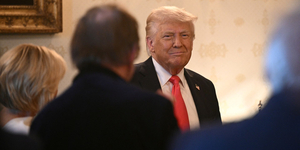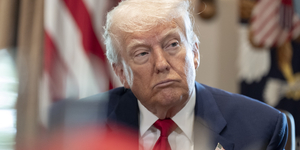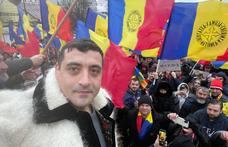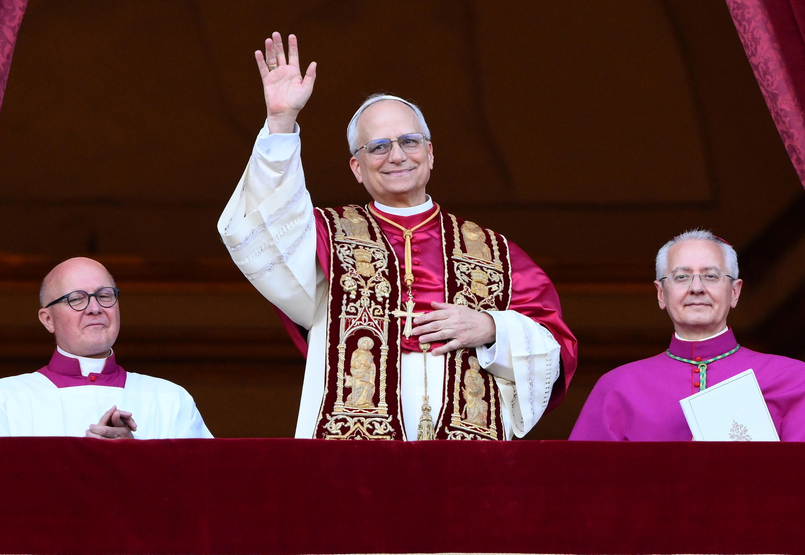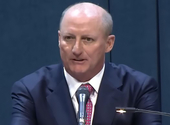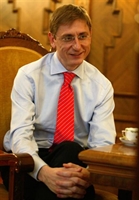 © Dudás Szabolcs |
You invited people concerned about the fate of the republic to your 1 April party rally. But why should anyone worry about the future of the republic in Hungary? You are surely not suggesting that our state needs to be defended from the provocative speeches of the leader of the opposition?
It is more than provocation if you hack into a party's computer system, if you keep records on people's party allegiances, or if you say that a republic, with all its guarantees, is just an item of clothing to be discarded. This is more than speechifying: there is a conscious plan behind this.
Increasingly, the campaign looks like a dual between two leaders. To what extent do you resemble Viktor Orbán, and in what ways are you different from him?
I do not want to analyse other people's characters. But I think there is a sharp difference between our approach to politics and theirs. I am a left-wing civic democrat. I believe that the market and the state can be reconciled. I see my rival as someone who flirts with nationalism, who holds anti-parliamentary views. He is opposed to the market and he is a populist who overemphasises the role of the state. He wants to stand above his party and the people, lording it over the right wing without any counterbalance.
Do you not think that, unlike with Orbán, who claims that his party's manifesto was written by 3.2m people, your messages - delivered in the first person singular, using slogans like "I see, I believe, I want" - look like those of a lonely politician with no stable camp behind him?
On the contrary - I have a strong and stable camp behind me. The Socialist Party's prime ministerial candidate is not a leader. He is elected, and he can be replaced. Most of the decisions he takes are the result of daily meetings involving 10 to 12 senior party figures. The situation is far more balanced than is generally believed.
But it would seem that certain of your views are not shared by the party. It is only you who talks of changing privileged 'two-thirds majority' laws, or about using private capital in the healthcare sector, or about holding a referendum on the euro. Are you improvising?
Some of our ideas derive from the New Hungary programme for development, others from the first 100 steps programme, which outlines the first tasks of a new government. This is always been extended. As far as the two-thirds laws are concerned, we are working on the basis that the Hungarian Democratic Forum-Free Democrat consensus established at the beginning of the 1990s is very stable, but has become an obstacle to reform. Regarding the euro, the Socialists are saying that we have to satisfy the Maastricht criteria by 2008. At some point, you have to ask the country if it is prepared to surrender some of its sovereignty. I want to raise the question: "Do you want this, Hungarians, or not?" I have no doubt that most will want it. But Parliament will decide.
In order to reduce the budget deficit to 3 per cent by 2008, expenditure will have to be cut by some HUF600bn. What will you save on?
The budget deficit has to be cut by more than 1 per cent a year, and we have to match the pace we set between 2005 and 2006. Part of the deficit can be covered by our relatively sustained 4 per cent economic growth. On the other hand, the government's social role cannot grow as fast as it has in the past. The coming years are going to be about intensive development and reform of the state. But I can tell everyone that these reforms will not bring in much cash in the short term.
And you stick to your position that you will not form a government until the coalition parties have signed a draft law on reform?
Absolutely.
What kind of reforms do you envisage?
We want to speed up the process of reforming central and local administration, and creating an insurance-based healthcare system. We want to rationalise the services provided by local authorities, like education, social provision and labour provisions.
The Socialists want to cut the number of ministries to 12. This reflects the the plan Tamás Sárközy drew up when former PM Péter Medgyessy asked him to devise a reform programme. Will the civil service also be subjected to the drastic diet the professor prescribed?
There are about 350 senior civil servants and ministers involved in the government. We will cut this number by 20 per cent. I cannot list the ministries, because this will be subject to coalition negotiations, but there will be no more than 12. Tamás Sárközy's proposal that the post of state secretary be abolished and replaced with that of deputy minister seems to me to be much clearer than the situation we have today.
The second part of the article (Oldaltörés)
 © Dudás Szabolcs |
Of the 10 state secretary positions in the Prime Minister's office, how many will remain?
A fraction. There is no need for a state secretary running each department.
We understand you have agreed with István Hiller that you will become party chairman, and he will lead a unified ministry for education and culture.
I deny this. If only because the Socialists have taught both István Hiller and I that things are not decided by an agreement between a couple of leaders - the party has its own desires. People who do not respect this will quickly discover that the party is stronger than they.
If you had known 15 years ago that you would become prime minister, that the way in which you became rich, your involvement in the privatisation process and your contracts with the state would be subject to the judgement of the court of public opinion, would you have done the same things?
More or less. All I can say is what I did was legal and moral. This may not always have been clear. But I learned that as prime minister I cannot afford to be misunderstood.
Do you think that with a background like this you could have been successful in an established Western democracy?
Yes, back when the old democracies were emerging. Transition influenced our laws, our legal system and our common moral norms. The Hungarian parliament cannot be confused with the English parliament. The world of Hungarian civil society should not be confused with Germany's. Hungarian trade unions are different from French and Italian ones.
Does it disturb you that you live in a villa that was once confiscated by the communists?
The family bought this villa legally. Almost everything belonged to the state in Hungary after 1948. A significant proportion of today's rich must therefore own property that once belonged to the state. There is no point in denying this past.
Yet the Left would seem to be at war with history, especially as far as its relationship with the decades before the regime change. I suppose this explains the scandal surrounding the awards you made on 15 March. When will we move beyond this identity crisis?
The Left has no doubts about the forty years before 1990, but it is more cautious and permissive in judging the roles played by individuals during that period. Historical continuity was broken in 1990, but people's lives continued. I think the Hungarian Left is reluctant to act as a kind of purifying judge, as the Right has. And it does not work: if somebody now works for the Right, then it is fine if he worked for the devil in the past. But if he argues with the Right, then he is a traitor who sold his soul for 30 pieces of silver. It is not the Left that has a problem with its identity. I think it is the larger opposition party that has an identity crisis, because it does not know if it happens currently to be following in the footsteps of Teleki, Bethlen, or maybe Tisza or even Kádár. If the Socialist Party's former vice-president works for them, then they are not sure if he was a good or a bad comrade, though they are sure he is now a good citizen.
What will you do if you lose?
I will stand before the party conference and tell them that was all I could do.
Some speculate that you might found a new party.
Out of the question.
Ibolya Jakus


